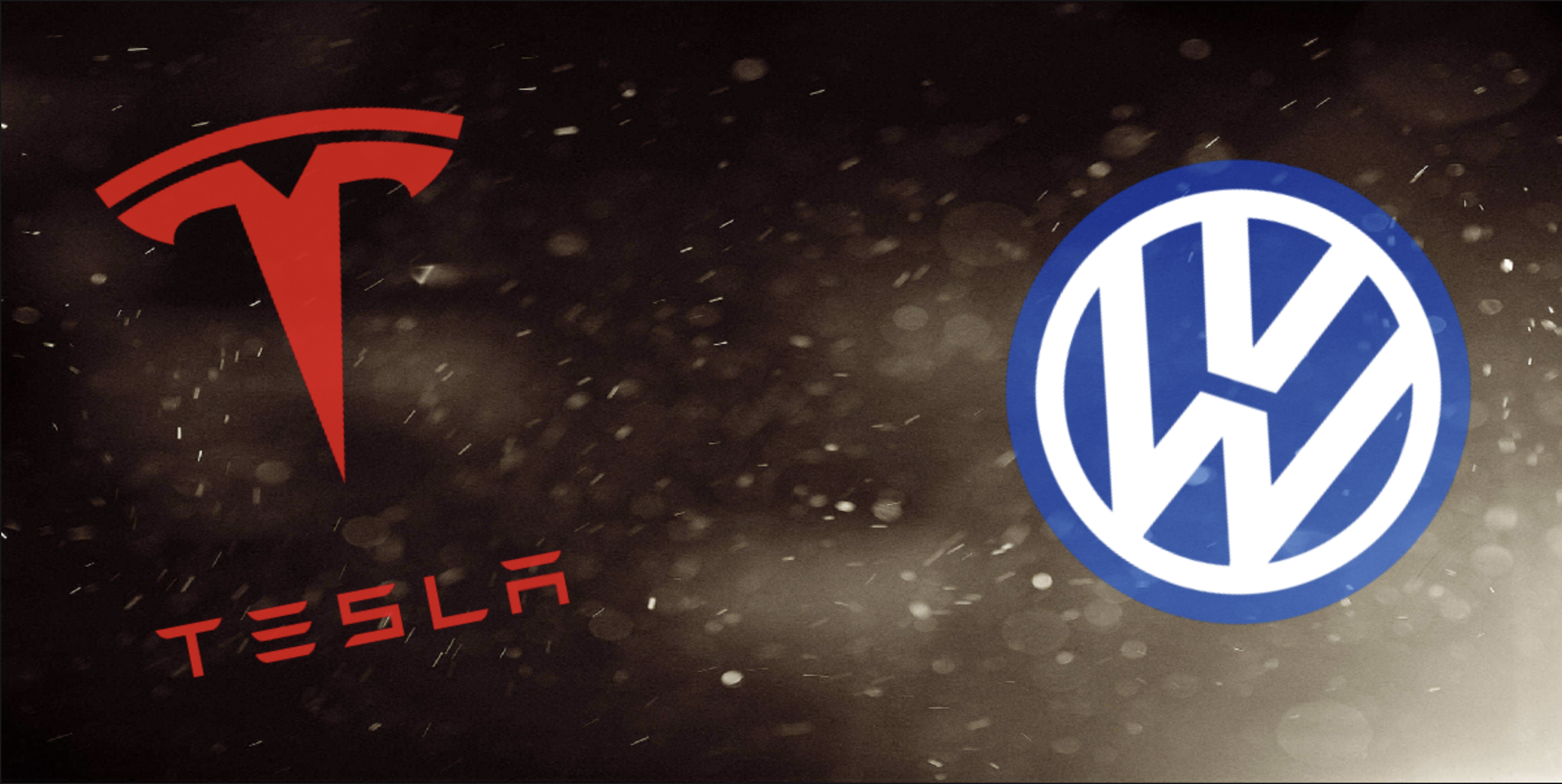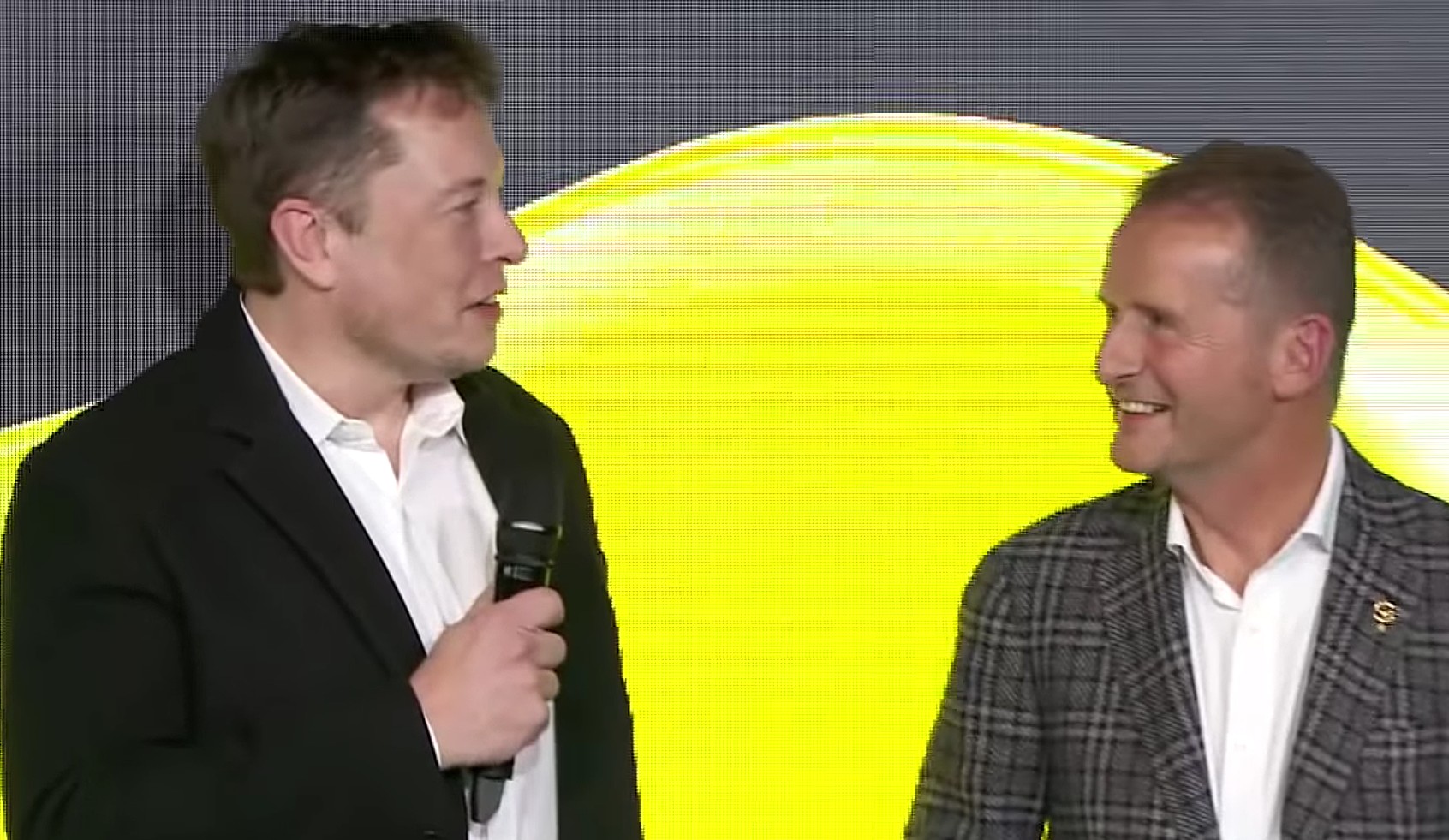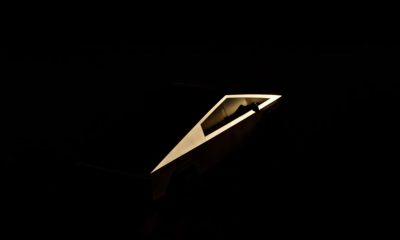

News
Tesla and Volkswagen: from fierce competitors to unlikely allies
Tesla and Volkswagen have established themselves as unlikely allies in the world of turning vehicles toward electrification. However, the two companies did not always see eye to eye, but the tides have certainly changed. Evidence of this comes just a day after Elon Musk took an unexpected stop in Western Germany to see Volkswagen Chairman Herbert Diess.
Years ago, Volkswagen and Tesla were sitting at opposite ends of the spectrum. One company was a well-established marvel of German automotive manufacturing, while the other was struggling to rally enough capital to keep its own production efforts moving forward.
However, 2020 has given the two companies and effective dose of the “Freaky Friday” treatment, where the former automaker is struggling to keep functioning EVs on the road. Meanwhile, the latter is surging forward the charge to electrification and maintains a healthy lead over other companies that are attempting to follow in their steps.
But from 2008 to 2015, Volkswagen was far from ever being considered a Tesla ally. The German automaker was violating the EPA’s Clean Air Act by knowingly placing cheat devices in their car’s emissions systems. The scandal, known as Dieselgate, set a semi-permanent mark in the minds of the environmentally-conscious.
Many swore never to consider repurchasing a Volkswagen vehicle, but the company has won some prominent figures in the EV community. Most notably, Elon Musk. But the relationship wasn’t always healthy.
Musk was critical of a conspiracy that a Volkswagen employee was criticizing Tesla through a fake name. According to numerous sources, Diess had the situation handled, but the drama between the two companies didn’t necessarily end there.
Dieselgate was still slightly in the head of Musk. The CEO mentioned that Tesla’s HEPA grade filter was needed while sitting in close traffic because toxic tailpipe emissions could affect the air quality of those who occupy vehicles that are around. “Good thing gas/diesel carmakers didn’t cheat on their emissions or we’d be in real trouble,” Musk joked, indirectly taking a jab at Volkswagen’s wrongdoing.
In close traffic, poisonous gas spewing from the car in front of you goes straight into your AC intake. Good thing gas/diesel carmakers didn’t cheat on their emissions or we’d be in real trouble 😅
— Elon Musk (@elonmusk) September 4, 2019
However, Musk has recognized that Diess is an ally and is driving Volkswagen toward electrification. The Tesla CEO even said that Diess is “doing more than any big carmaker to go electric. For what it’s worth, he has my support.”
Musk and Diess then appeared on stage together at the Golden Steering Wheel Awards in Berlin last November, trading compliments and smiling from ear to ear with encouragement. The two had shown their business ventures had resulted in a healthy friendship, and Musk even announced that Tesla would be bringing a new facility to Berlin on the same evening.

In early September 2020, Musk flew to Germany to conduct business. His final stop on his quick tour of the country was to pay his friend Diess a brief visit, where Musk drove the ID.3 from Volkswagen and took a peek at the Model Y’s competition in the ID.4. With Giga Berlin moving along swiftly and Tesla intending to start manufacturing vehicles in July 2021, it would seem that Diess would want to keep a competitor at bay and not reveal his plans for an electric car. But he was more than willing to show Musk around. Why?
While company collaborations are rare in the automotive sector, a Tesla and Volkswagen one wouldn’t be a far-fetched idea. The two companies have executives that are more than willing to show their products to each other, and the two could also help each other in improving their businesses. Volkswagen has been building cars in Germany since 1937. Eighty-five years of market data could help Tesla make an enormous impact on the German market, and Volkswagen could undoubtedly share some hints if Tesla required them.
Meanwhile, Volkswagen has had a very public problem with its MEB infrastructure within the ID family of cars. Tesla, on the other hand, has established itself as the most prominent figure in terms of software and EV tech, and it could always lend a helping hand to Volkswagen, especially considering Musk is more than willing to help electrified fleets come to life. “Tesla is open to licensing software and supplying powertrains & batteries,” Musk said to Teslarati In July. “We’re just trying to accelerate sustainable energy, not crush competitors!
Whether the two companies decide to help, each other remains to be seen. But, the partnership will help both Tesla and Volkswagen out, and in the big picture, enable the acceleration to sustainable energy to occur faster.
Elon Musk
Tesla begins expanding Robotaxi access: here’s how you can ride
You can ride in a Tesla Robotaxi by heading to its website and filling out the interest form. The company is hand-picking some of those who have done this to gain access to the fleet.

Tesla has begun expanding Robotaxi access beyond the initial small group it offered rides to in late June, as it launched the driverless platform in Austin, Texas.
The small group of people enjoying the Robotaxi ride-hailing service is now growing, as several Austin-area residents are receiving invitations to test out the platform for themselves.
The first rides took place on June 22, and despite a very small number of very manageable and expected hiccups, Tesla Robotaxi was widely successful with its launch.
Tesla Robotaxi riders tout ‘smooth’ experience in first reviews of driverless service launch
However, Tesla is expanding the availability of the ride-hailing service to those living in Austin and its surrounding areas, hoping to gather more data and provide access to those who will utilize it on a daily basis.
Many of the people Tesla initially invited, including us, are not local to the Austin area.
There are a handful of people who are, but Tesla was evidently looking for more stable data collection, as many of those early invitees headed back to where they live.
The first handful of invitations in the second round of the Robotaxi platform’s Early Access Program are heading out to Austin locals:
I just got a @robotaxi invite! Super excited to go try the service out! pic.twitter.com/n9mN35KKFU
— Ethan McKanna (@ethanmckanna) July 1, 2025
Tesla likely saw an influx of data during the first week, as many traveled far and wide to say they were among the first to test the Robotaxi platform.
Now that the first week and a half of testing is over, Tesla is expanding invites to others. Many of those who have been chosen to gain access to the Robotaxi app and the ride-hailing service state that they simply filled out the interest form on the Robotaxi page of Tesla’s website.
That’s the easiest way you will also gain access, so be sure to fill out that form if you have any interest in riding in Robotaxi.
Tesla will continue to utilize data accumulated from these rides to enable more progress, and eventually, it will lead to even more people being able to hail rides from the driverless platform.
With more success, Tesla will start to phase out some of the Safety Monitors and Supervisors it is using to ensure things run smoothly. CEO Elon Musk said Tesla could start increasing the number of Robotaxis to monitors within the next couple of months.
Elon Musk
Tesla analyst issues stern warning to investors: forget Trump-Musk feud

A Tesla analyst today said that investors should not lose sight of what is truly important in the grand scheme of being a shareholder, and that any near-term drama between CEO Elon Musk and U.S. President Donald Trump should not outshine the progress made by the company.
Gene Munster of Deepwater Management said that Tesla’s progress in autonomy is a much larger influence and a significantly bigger part of the company’s story than any disagreement between political policies.
Munster appeared on CNBC‘s “Closing Bell” yesterday to reiterate this point:
“One thing that is critical for Tesla investors to remember is that what’s going on with the business, with autonomy, the progress that they’re making, albeit early, is much bigger than any feud that is going to happen week-to-week between the President and Elon. So, I understand the reaction, but ultimately, I think that cooler heads will prevail. If they don’t, autonomy is still coming, one way or the other.”
BREAKING: GENE MUNSTER SAYS — $TSLA AUTONOMY IS “MUCH BIGGER” THAN ANY FEUD 👀
He says robotaxis are coming regardless ! pic.twitter.com/ytpPcwUTFy
— TheSonOfWalkley (@TheSonOfWalkley) July 2, 2025
This is a point that other analysts like Dan Ives of Wedbush and Cathie Wood of ARK Invest also made yesterday.
On two occasions over the past month, Musk and President Trump have gotten involved in a very public disagreement over the “Big Beautiful Bill,” which officially passed through the Senate yesterday and is making its way to the House of Representatives.
Musk is upset with the spending in the bill, while President Trump continues to reiterate that the Tesla CEO is only frustrated with the removal of an “EV mandate,” which does not exist federally, nor is it something Musk has expressed any frustration with.
In fact, Musk has pushed back against keeping federal subsidies for EVs, as long as gas and oil subsidies are also removed.
Nevertheless, Ives and Wood both said yesterday that they believe the political hardship between Musk and President Trump will pass because both realize the world is a better place with them on the same team.
Munster’s perspective is that, even though Musk’s feud with President Trump could apply near-term pressure to the stock, the company’s progress in autonomy is an indication that, in the long term, Tesla is set up to succeed.
Tesla launched its Robotaxi platform in Austin on June 22 and is expanding access to more members of the public. Austin residents are now reporting that they have been invited to join the program.
Elon Musk
Tesla surges following better-than-expected delivery report
Tesla saw some positive momentum during trading hours as it reported its deliveries for Q2.

Tesla (NASDAQ: TSLA) surged over four percent on Wednesday morning after the company reported better-than-expected deliveries. It was nearly right on consensus estimations, as Wall Street predicted the company would deliver 385,000 cars in Q2.
Tesla reported that it delivered 384,122 vehicles in Q2. Many, including those inside the Tesla community, were anticipating deliveries in the 340,000 to 360,000 range, while Wall Street seemed to get it just right.
Tesla delivers 384,000 vehicles in Q2 2025, deploys 9.6 GWh in energy storage
Despite Tesla meeting consensus estimations, there were real concerns about what the company would report for Q2.
There were reportedly brief pauses in production at Gigafactory Texas during the quarter and the ramp of the new Model Y configuration across the globe were expected to provide headwinds for the EV maker during the quarter.
At noon on the East Coast, Tesla shares were up about 4.5 percent.
It is expected that Tesla will likely equal the number of deliveries it completed in both of the past two years.
It has hovered at the 1.8 million mark since 2023, and it seems it is right on pace to match that once again. Early last year, Tesla said that annual growth would be “notably lower” than expected due to its development of a new vehicle platform, which will enable more affordable models to be offered to the public.
These cars are expected to be unveiled at some point this year, as Tesla said they were “on track” to be produced in the first half of the year. Tesla has yet to unveil these vehicle designs to the public.
Dan Ives of Wedbush said in a note to investors this morning that the company’s rebound in China in June reflects good things to come, especially given the Model Y and its ramp across the world.
He also said that Musk’s commitment to the company and return from politics played a major role in the company’s performance in Q2:
“If Musk continues to lead and remain in the driver’s seat, we believe Tesla is on a path to an accelerated growth path over the coming years with deliveries expected to ramp in the back-half of 2025 following the Model Y refresh cycle.”
Ives maintained his $500 price target and the ‘Outperform’ rating he held on the stock:
“Tesla’s future is in many ways the brightest it’s ever been in our view given autonomous, FSD, robotics, and many other technology innovations now on the horizon with 90% of the valuation being driven by autonomous and robotics over the coming years but Musk needs to focus on driving Tesla and not putting his political views first. We maintain our OUTPERFORM and $500 PT.”
Moving forward, investors will look to see some gradual growth over the next few quarters. At worst, Tesla should look to match 2023 and 2024 full-year delivery figures, which could be beaten if the automaker can offer those affordable models by the end of the year.
-

 Elon Musk2 days ago
Elon Musk2 days agoTesla investors will be shocked by Jim Cramer’s latest assessment
-

 News1 week ago
News1 week agoTesla Robotaxi’s biggest challenge seems to be this one thing
-

 Elon Musk2 weeks ago
Elon Musk2 weeks agoElon Musk slams Bloomberg’s shocking xAI cash burn claims
-

 News2 weeks ago
News2 weeks agoTexas lawmakers urge Tesla to delay Austin robotaxi launch to September
-

 Elon Musk1 week ago
Elon Musk1 week agoFirst Look at Tesla’s Robotaxi App: features, design, and more
-

 Elon Musk2 weeks ago
Elon Musk2 weeks agoTesla Robotaxis are becoming a common sight on Austin’s public roads
-

 Elon Musk2 weeks ago
Elon Musk2 weeks agoSpaceX President meets India Minister after Starlink approval
-

 Elon Musk2 weeks ago
Elon Musk2 weeks agoxAI’s Grok 3 partners with Oracle Cloud for corporate AI innovation















